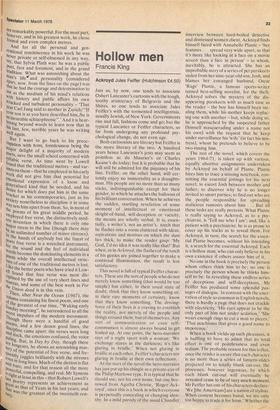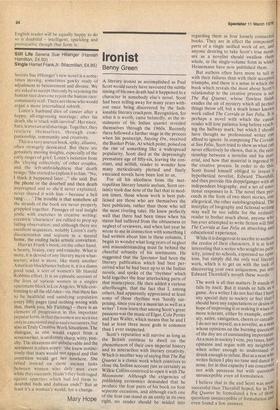Hollow men
Francis King
Ackroyd Jules Feiffer (Hutchinson £4.50)
Just as, by now, one tends to associate Osbert Lancaster's cartoons with the tough, toothy aristocracy of Belgravia and the Shires, so one tends to associate Jules Feiffer's with the tormented intelligentsia, usually Jewish, of New York. Governments rise and fall, fashions come and go; but the typical Lancaster or Feiffer characters, so far from undergoing any profound psychological change, do not even age.
Both cartoonists are literary but Feiffer is the more literary of the two. A hundred
years hence Lancaster's jests may seem as pointless as du Maurier's or Charles Keane's do today; but it is probable that he will still be admired for the piquancy of his line. Feiffer, on the othei hand, will certainly enjoy no immortality as a draughtsman. His people are no more than so many sticks, indistinguishable except for their gender, to which he attaches the balloons of his brilliant conversation. When he achieves the sudden, startling revelation of some moment of intellectual or emotional sleight-of-hand, self-deception or vacuity, the means are wholly verbal. It is, essentially, a writer's, not an artist's, torch that he flashes into a room cluttered with ideas, aspirations and motives on which the dust lies thick, to make the reader gasp: `My God, I'd no idea it was really like that!' But when, as in Ackroyd, the flashes of the torch of his genius are joined together to make a continual illumination, the result is less satisfactory.
This novel is full of typical Feiffer characters. These are the sort of people who do not merely know something (that would be too simple) but either, in their usual state of doubt, think that they know something or, in their rare moments of certainty, know that they know something. The drivingforce of their lives is a craving to establish the reality, not merely of the people and things around them,' but of themselves. Any sort of communication or even selfcommunion is almost always bound to get fouled up. At one point, the hero-narrator says of a night spent with a woman: 'We exchange stares in the darkness; it's like glaring in braille.' When not glaring in braille at each other, Fciffer's characters are glaring in braille at their own reflections.
At the start of the novel the hero-narrator has just put up his shingle as a private-eye of
the Philip Marlowe type. It is typical that he should use, not his own name, but one borrowed from Agatha Christie, 'Roger Ack royd', since this is a book in which everyone is perpetually concealing or changing identity. In a mild parody of the usual Chandler interview between hard-boiled detective and distressed women client, Ackroyd finds himself faced with Annabelle Plante — 'her features. . . spread very wide apart, so that it's more like looking at a face on a movie screen than a face in person' — to whom, inevitably, he is attracted. She has an improbable story of a series of pet parakeets stolen from her nine-year-old son, Josh, and blames her estranged husband, Oscar 'Rags' Plante, a famous sports-writer turned best-selling novelist, for the theft. Ackroyd solves the mystery of the disappearing parakeets with as much ease as the reader — the boy has himself been stealing them, while his mother keeps replacing one with another — but, while doing so, he is approached by the suspected father (himself masquerading under a name not his own) with the request that he keep under surveillance his'`wife' (in fact his mistress), whom he pretends to believe to be two-timing him.
The rest of the novel, which covers the years 1964771, is taken up with various, equally abortive assignments undertaken by Ackroyd on behalf of Plante. Plante hires him to trace a missing notebook, containing the essential jottings for his next novel; to escort Josh between mother and father; to discover why he is no longer invited to smart parties; to find out who are the people responsible for spreading malicious rumours about him . . . But all these tasks are really pretexts. What Plante is really saying to Ackroyd, as to a psychiatrist, is 'Tell me who I am'; and, like a patient with a psychiatrist, he is as prone to cover up his tracks as to reveal them. For Ackroyd, in turn, the search for the essential Plante becomes, without his intending it, a search for the essential Ackroyd. Each is a hollow man, who can only believe in his own existence if others assure him of it.
No one in the book is precisely the person whom others think him to be; no one is precisely the person whom he thinks himself to be. In revealing these endless series of deceptions and self-deceptions, Mr Feiffer has produced some splendid passages of dialogue. In contrast with the enervation of style so common in English novels, there is hardly a page that does not crackle with electricity. 'His eyes appear to be the only part of him not under sedation.' She wears enough rings to cut a man to pieces.' 'That machismo that gives a good name to impotence.'
When a book yields up such pleasures, n is baffling to have to admit that its total. effect is one of pointlessness and even tedium. The probable reason for this is that, once the reader is aware that each character is no more than a series of lantern-slides projected on to totally blank cut-out, the processes, however ingenious, by which each blank cut-out will eventually be revealed cease to be of very much moment. Mr Feiffer has one of his characters declare; 'We [the Americans] arc a nation of stylists. When content becomes banal, we are only too happy to trade it for form.' Whether the
English reader will he equally happy to do so is doubtful — intelligent, sparkling and provocative though that form is.
Still Life Serena Sue Hi'singer (Hamish Hamilton, E4.50) Single Harriet Frank Jr. (Macmillan, £4.95) Serena Sue Hilsinger's new novel is a sometimes moving, sometimes gawky study of adjusiment to bereavement and divorce. We are asked to accept that only by rejoining the human race does one rejoin the human race: community is all. There are those who would argue a more internalised rebirth.
Loren's husband dies of cancer after a happy, all-engrossing marriage ; after his death, she is 'stuck with survival'. Her niece, Sara, leaves an arid marriage. Together, they retrieve themselves, through companionship, community and creativity.
This is a very uneven book, spiky, allusive, often strangely dessicated. But there are genuinely moving insights, especially of the early stages of grief: Loren's isolation from the 'cloying collectivity' of other couples, and the left-unfinishedness that death brings: 'She started to explain it to him. "No, I think it happened later..." she said. But the phone or the doorbell and then death interrupted and so she'd never explained, never shared it with him — because a bell rang.. . . 'The trouble is that somehow all the strands of the book are never properly grappled together. Passages of real insight jostle with exercisesin creative writing: eccentric 'characters' are rallied to prop up failing observation; and although there are excellent sequences, notably Loren's early disorientation and sojourn in a mental home, the ending lacks artistic conviction.
Harriet Frank's book, on the other hand, is hearty, brainy, racy and raunchy. What is more, it is devoid of any literary merit whatsoever; what is more, like many another American blockbuster before it, it is a damn good read, a sort of women's lib Harold Robbins effort. It is an episodic account of the lives of various women in a singles apartment-block in Los Angeles. While con forming to all the old rules—viz, that there has U) be healthful and satisfying copulation every fifty pages (and nothing wrong with that, thank you, Mr Fielding) — there is an element of progression in this important
popular form, in that the women are seen not only in emotional and sexual encounters, but
also in Truly Creative Work Situations. The dialogue, as one would expect from a screenwriter, is uniformly sharp, witty, pun chy. The situations are unbelievable and the sentiment is often soppy: 'she knew instinctively that tears would not appeal and that contrition would get her nowhere. She
relied . instead on those ancient links between women who defy men even
while they succumb:Hadn't they both raged against appetites which had led them to doubtful beds and dubious ends?' But at least it's a woman's world, for a change.
Mary Hope



































 Previous page
Previous page